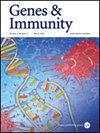对胶质瘤中热休克蛋白的综合分析揭示了其与胶质瘤相关髓样细胞的关联。
IF 4.5
3区 医学
Q1 GENETICS & HEREDITY
引用次数: 0
摘要
在中枢神经系统中,胶质瘤是主要的原发性脑肿瘤。热休克蛋白对肿瘤进展和肿瘤免疫微环境有重要影响。然而,热休克蛋白在胶质瘤中的研究仍不明确。我们分析了来自CPTAC、TCGA和GTEx数据库的数据,确定了7个对胶质瘤预后至关重要的热休克蛋白基因。随后,通过Lasso回归,构建基于热休克蛋白基因(DNAJC7、DNAJC12、HSPB2、HSP90B1、HSPA5)的模型。风险评分与免疫评分呈正相关。对免疫细胞的进一步研究发现,HSPA5和HSP90B1在胶质瘤中表达水平较高,且与M2巨噬细胞浸润显著相关。考虑到HSP90B1在胶质瘤中的研究有限,我们进一步发现HSP90B1可能与肿瘤内PI3K/AKT和Wnt/β-catenin这两条关键信号通路有关。鉴于乳酸可以促进巨噬细胞M2极化,我们进一步发现HSP90B1可以增强糖酵解相关基因的转录,包括LDHA。总的来说,我们的研究表明,热休克蛋白基因与胶质瘤患者的预后显著相关。此外,我们观察到HSP90B1与M2巨噬细胞浸润有显著关系,并可能调节胶质瘤中的LDHA水平。本文章由计算机程序翻译,如有差异,请以英文原文为准。

Comprehensive analysis of heat shock proteins in glioma revealed the association with glioma-associated myeloid cells
In the central nervous system, glioma stands as the predominant primary brain tumor. Heat shock proteins exerted a critical influence on tumor progression and tumor immune microenvironment. However, research on heat shock proteins in glioma remained ambiguous. We analyzed data from the CPTAC, TCGA, and GTEx databases, identifying seven heat shock protein genes critical to glioma prognosis. Subsequently, through Lasso regression, a model based on heat shock protein genes (DNAJC7, DNAJC12, HSPB2, HSP90B1, HSPA5) was constructed. And the risk score showed a positive correlation to the immune score. Further investigation into immune cells revealed that HSPA5 and HSP90B1 were expressed at higher levels in glioma and significantly linked to M2 macrophage infiltration. Considering the limited research on HSP90B1 in glioma, we further revealed that HSP90B1 might have a connection with two crucial signaling pathways within tumors: PI3K/AKT and Wnt/β-catenin. Given that lactate could promote the M2 polarization of macrophages, we further found that HSP90B1 could enhance the transcription of glycolysis-related genes, including LDHA. Overall, our study demonstrated that heat shock protein genes were significantly linked to glioma patient prognosis. Additionally, we observed that HSP90B1 had a significant relationship with M2 macrophage infiltration and potentially regulated LDHA level in glioma.
求助全文
通过发布文献求助,成功后即可免费获取论文全文。
去求助
来源期刊

Genes and immunity
医学-免疫学
CiteScore
8.90
自引率
4.00%
发文量
28
审稿时长
6-12 weeks
期刊介绍:
Genes & Immunity emphasizes studies investigating how genetic, genomic and functional variations affect immune cells and the immune system, and associated processes in the regulation of health and disease. It further highlights articles on the transcriptional and posttranslational control of gene products involved in signaling pathways regulating immune cells, and protective and destructive immune responses.
 求助内容:
求助内容: 应助结果提醒方式:
应助结果提醒方式:


